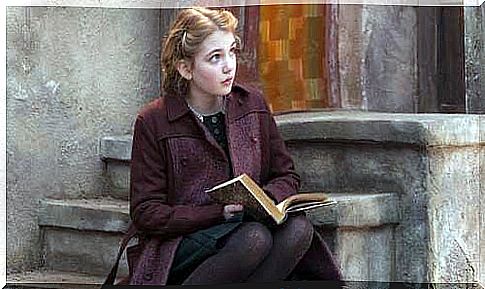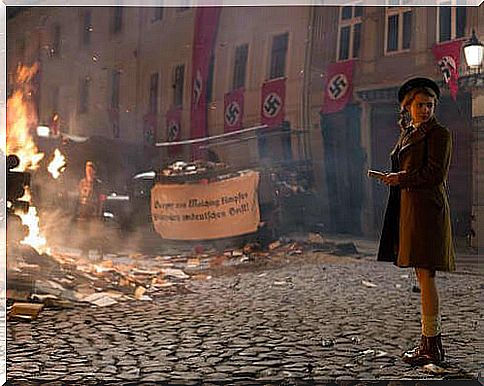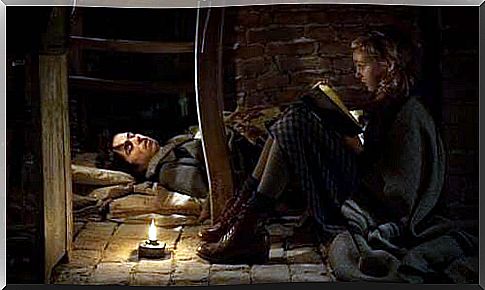Story Of A Book Thief: The Power Of Words

When you are about to see The Story of a Book Thief (Brian Percival, 2013), a film based on the novel of the same name by Markus Zusak, it is normal to think of being faced with “another drama about Nazism”. The Second World War is a scenario that cinema wanted to squeeze to the maximum, it has been feeding on it for decades. So much so that we are tired of seeing films focused on this historic event.
It is certainly not a bad thing to tackle the topic from multiple perspectives, and personally I think it is interesting to talk about the past and keep it in mind, especially so as not to make the same mistakes. But boredom is understandable and often wins.
Story of a book thief , however, tells something else, something that unites the present, the past and the future: death. Some may be reluctant, as it is a tear-jerking film. Yet, while forcing some scenes, Story of a Book Thief does not want to make us cry, but only to make us accept the inevitable fate that looms.
We are not in a concentration camp and we never see Hitler, even if we can perceive him in the environment as a threat, an omnipresent, invisible and merciless being. The film immerses us in the daily life of the city whose inhabitants do not know what will happen and try to move forward as they can. Everything is written over time, the characters do not know their destiny.
Some will accept the rise of Nazism with resignation, others will welcome it with open arms. And, among the multitude, a little girl stands out whose life is marked by misfortune: first separation from her mother, then the death of her brother.
Liesel will be adopted by a rather elderly couple. At first, she will feel like a stranger, will not get along with her mother and will not understand how the world works or why she is being labeled a communist. Through Liesel’s eyes, and with the voice of death, we discover a story that oscillates between tale and reality, between life and death.
| 20th Century Fox” loading = “lazy” width = “500” height = “281” src = ” https://www.youtube.com/embed/hoL_bnwWtoQ?feature=oembed “frameBorder =” 0 “allow =” accelerometer; autoplay; clipboard-write; encrypted-media; gyroscope; picture-in-picture “allowfullscreen =” ” ]
Story of a book thief: reading to escape
Story of a Book Thief is not a must-see film nor one of the most praised of the genre. Nonetheless, it conveys an important message about the power of words. The word is another protagonist of the film, it is the escape route that will allow the protagonists to survive in a horrible world. As anticipated, the action takes place in the daily life, within the city, of the families of the working class taken aback by the Nazis.
When Liesel arrives at her new home, she is only a child but has already lost the most important people in her life. She can’t read and at school they make fun of her for it. What’s more, he comes from a communist family.
It is interesting to see how children repeat what adults say while ignoring its meaning. Some children will insult Liesel by screaming at her as “communist,” but neither they nor Liesel really know what it means to be a communist.
The indoctrination of the school is also evident, the children sing without knowing what the lyrics of the song hide. And here lies part of the film’s message: Liesel is branded illiterate, but the other children don’t know the meaning of many words even though they can read. Are only those who cannot read illiterate?
At the beginning of the film, during her brother’s funeral, Liesel steals a book of which she does not know the meaning, but for her it is very important, it is a link with her past, with her brother. The adoptive father will discover the book and teach her to read. It is not a novel or a short story, but a simple manual for the gravediggers. Death, again, makes its presence felt.

In books and words Liesel will find an important escape route, a way to immerse himself in other worlds and learn. Books can turn into a weapon, a means to develop thought, which is why the Nazis wanted to destroy them. During a bonfire of books considered immoral, Liesel manages to recover one, Fahrenheit 451 ; but here we are not in a dystopia, we are in the real world, in the not so distant past.
This gesture is significant. Liesel will share a love for books and words with his family and with Max, a young Jew who hides in his family’s basement. Later, his friend Rudy will also share his secret and, in a sense, with the mayor’s wife. The books allow Liesel to dream and Max to get out of his hiding place.
The true power of the word is manifested when the inhabitants of the city have to hide in an air raid shelter during a bombing raid. At that moment, worry, fear and pain take over people. Liesel decides to tell a story; he conveys his love for words to those terrified people. And it succeeds. In that dark place, tranquility returns and words win against bombs.
Nobody escapes death
The protagonists fear two things: death and Hitler. Neither figure appears physically, but we can perceive them. We witness a very interesting scene in which Liesel and Rudy scream “I hate Hitler”. A scream that indicates that they are no longer afraid, that they are no longer terrified and can accept their fate.
The same happens with death. Liesel has known her since she was a child, he has seen her everywhere, but it has not stopped her life. We will all die one day, death is the only sure thing and does not make differences in social status or geographical boundaries.
Liesel dodges death on several occasions, just like Max who looked like he might be the first to die. Other characters may not have the same luck, but eventually, the time will come for Liesel and Max as well. Death approaches from the beginning of our lives.

In A Book Thief’s Story , death will comment on what we see in a quiet, calm voice. If we are to fear someone, we should fear the living. Even in the worst case scenario, Liesel finds room for optimism, so we see her hugging the mayor’s wife after the terrible bombing that kills almost all of the inhabitants.
The voiceover is almost ironic in certain points, but at the same time it is connected to the reality of its essence, of its nature. He also acts as a judge, balancing the scales. Which brings us back to the art and cliché of the memento mori. Death is a kind of executioner, at times benevolent, at others merciless, but she is not an enemy.
Story of a book thief transports us into a story full of humanity, friendship and growth in a horrible, dark and oppressive world.
It is clear that it does not stop being a fictional story and does not have the same impact as real tales like the Diary of Anne Frank , but it remains a pleasant tale that reminds us that we must accept our destiny with patience and without fear.









